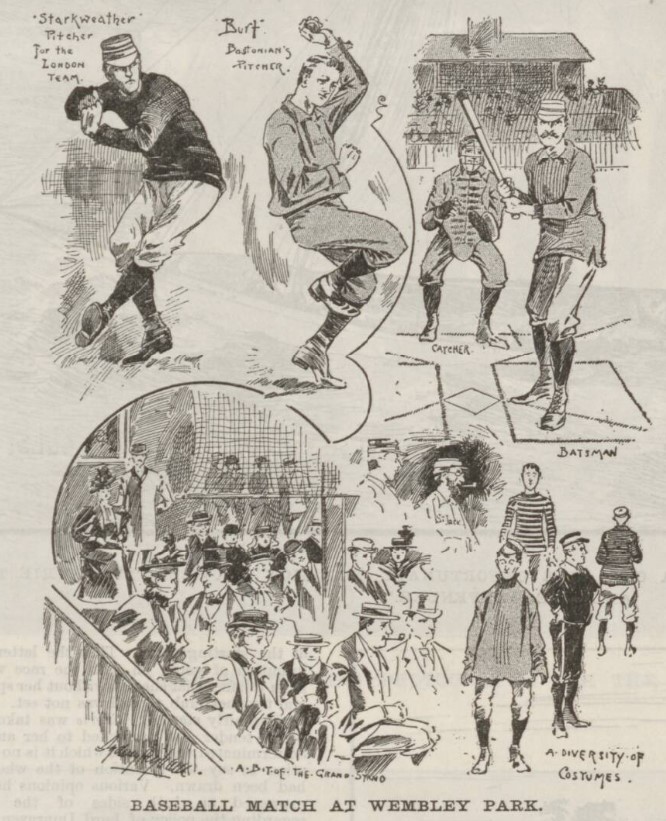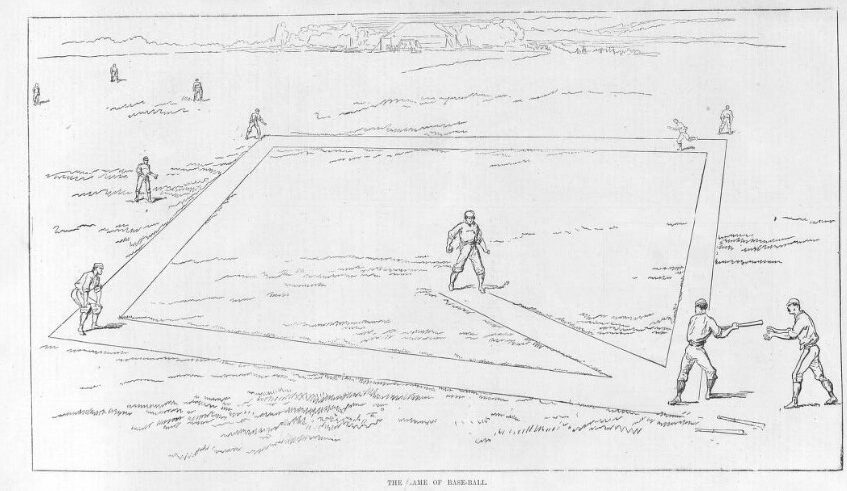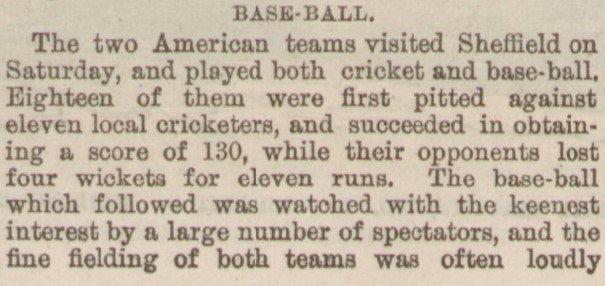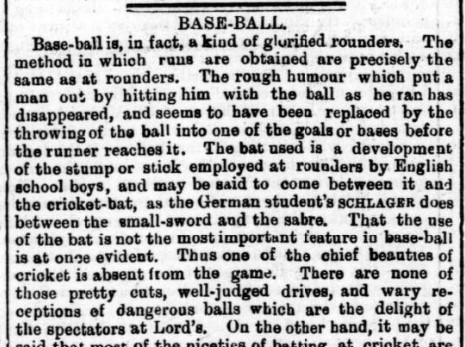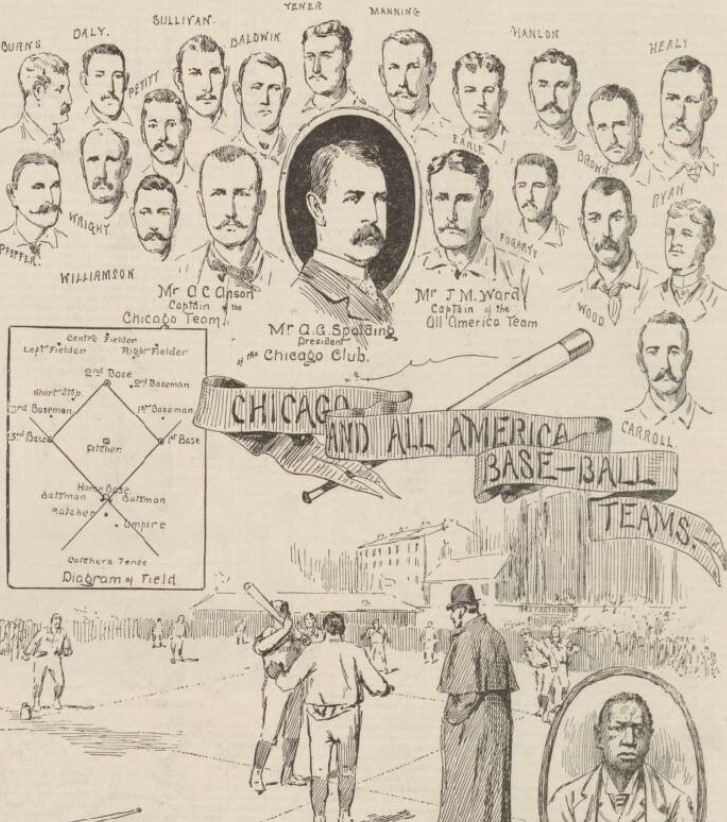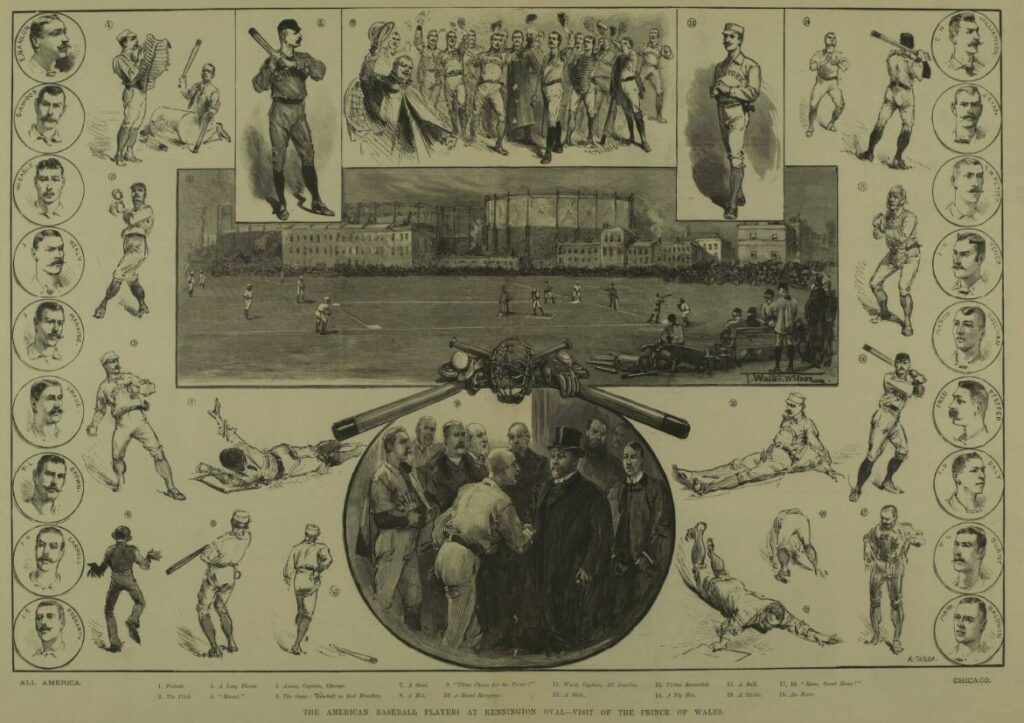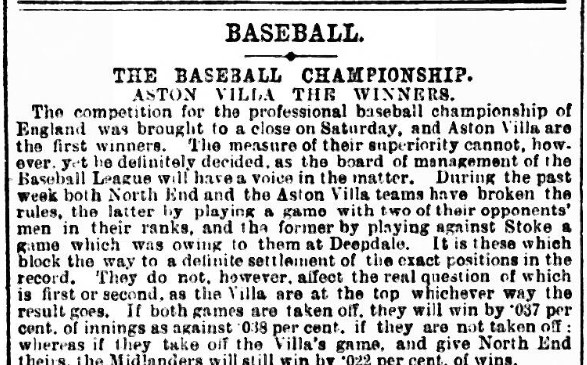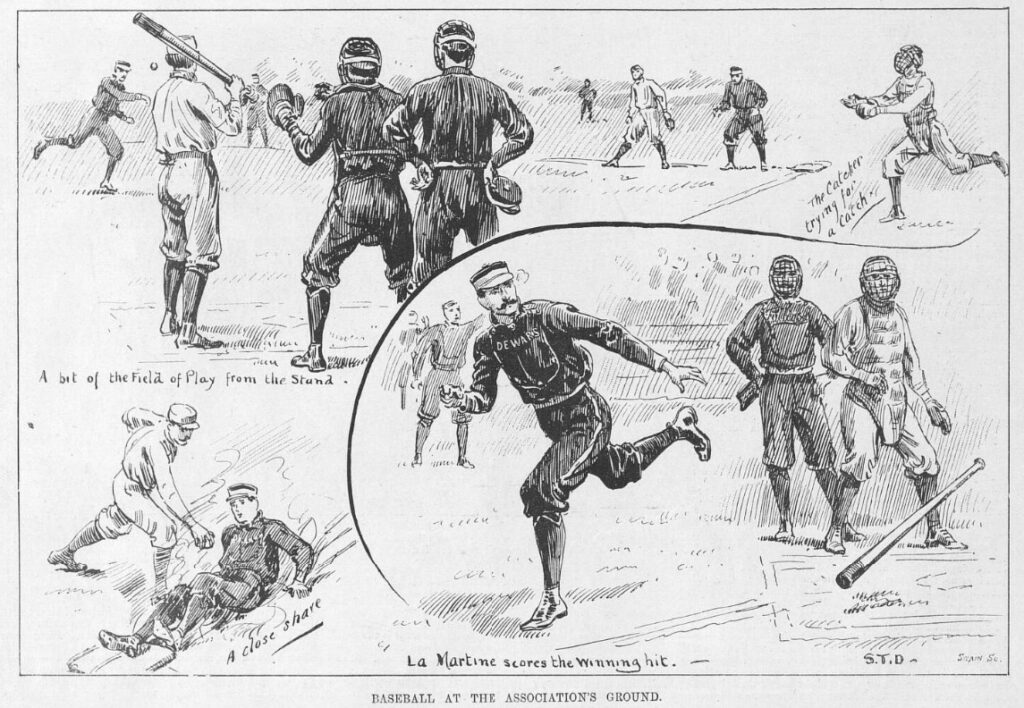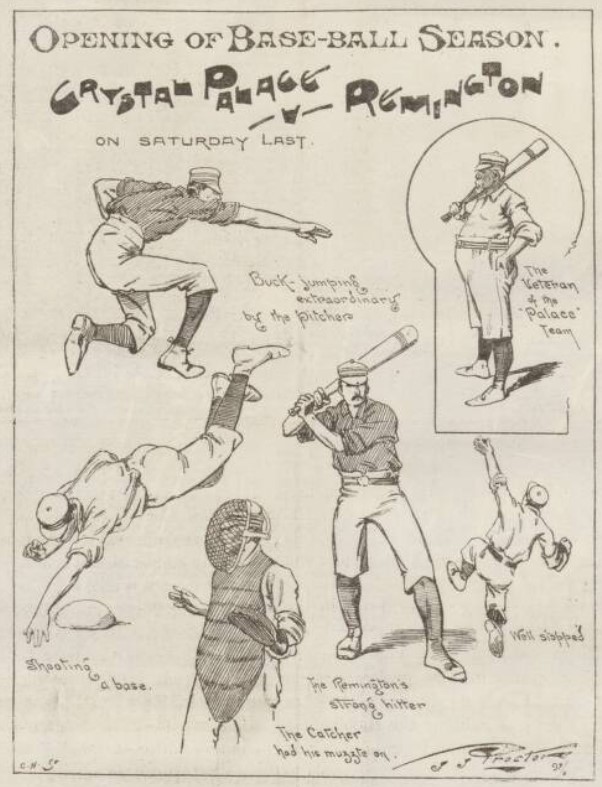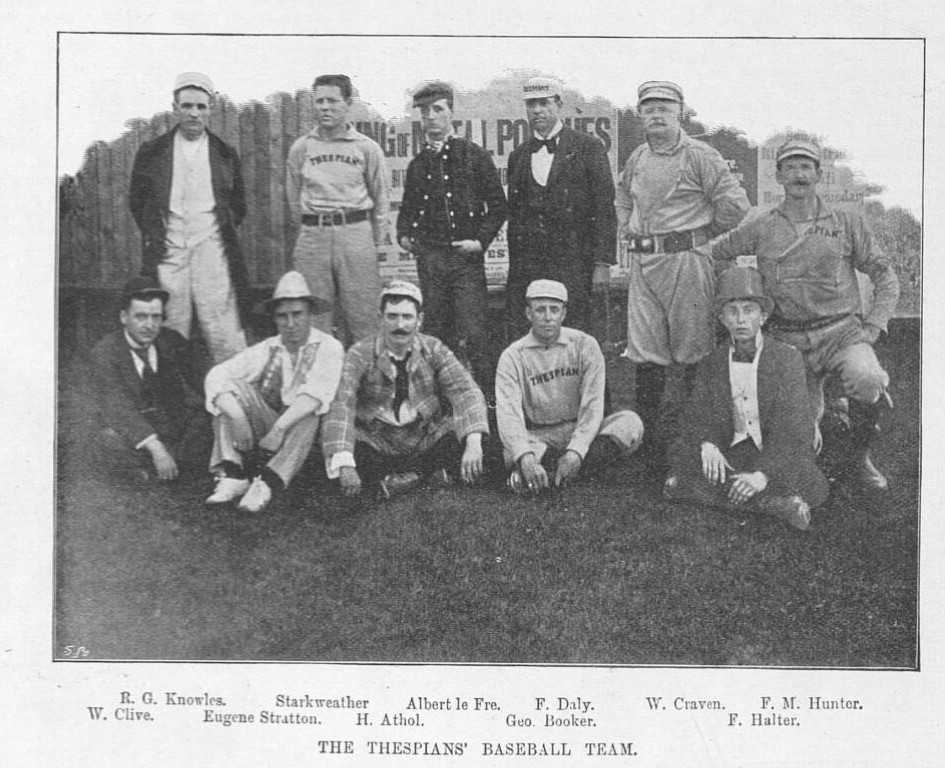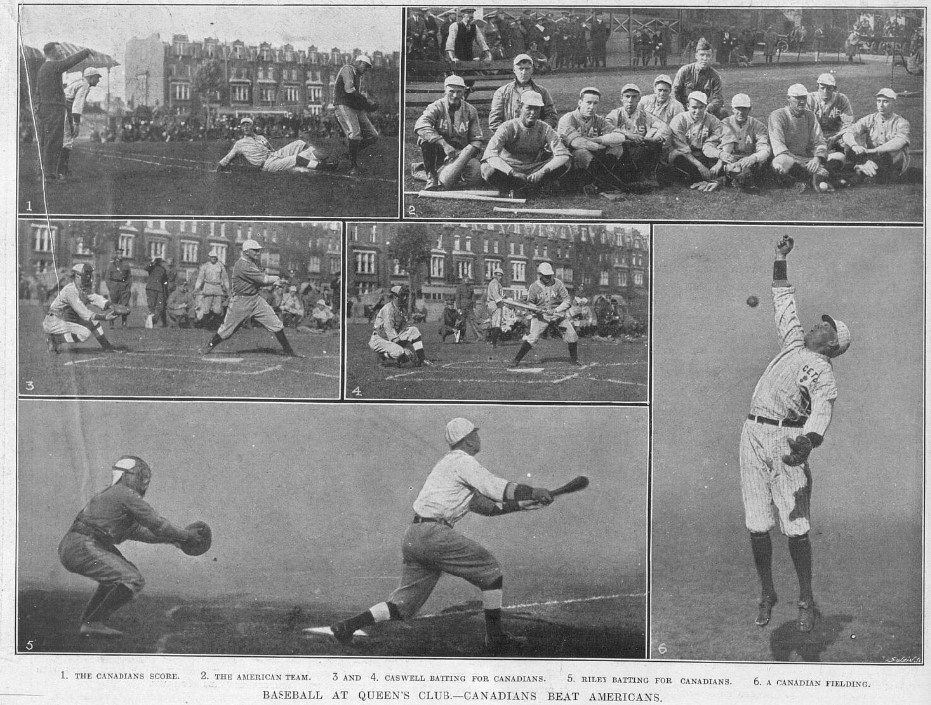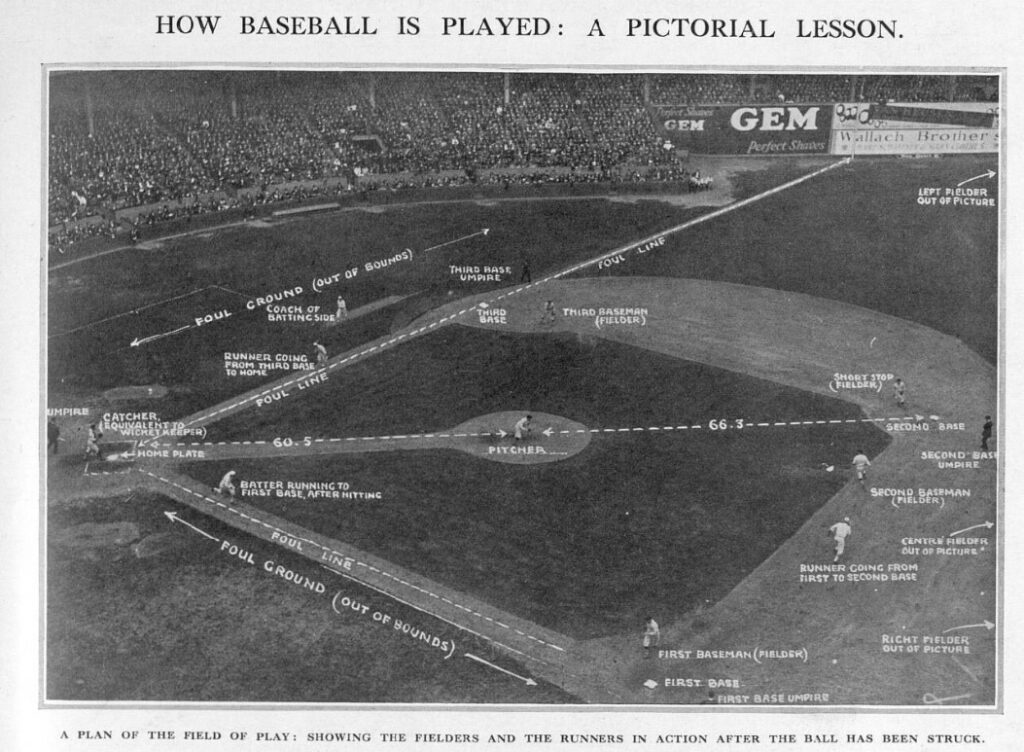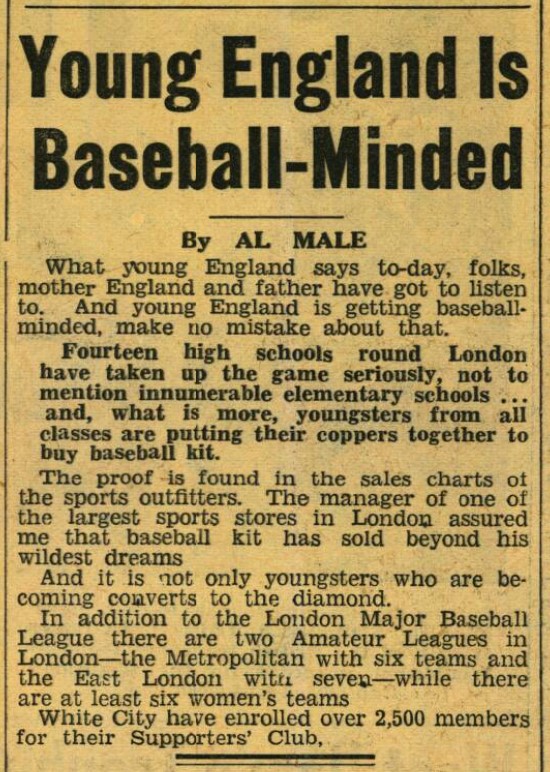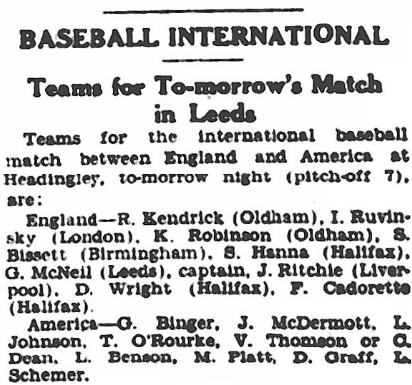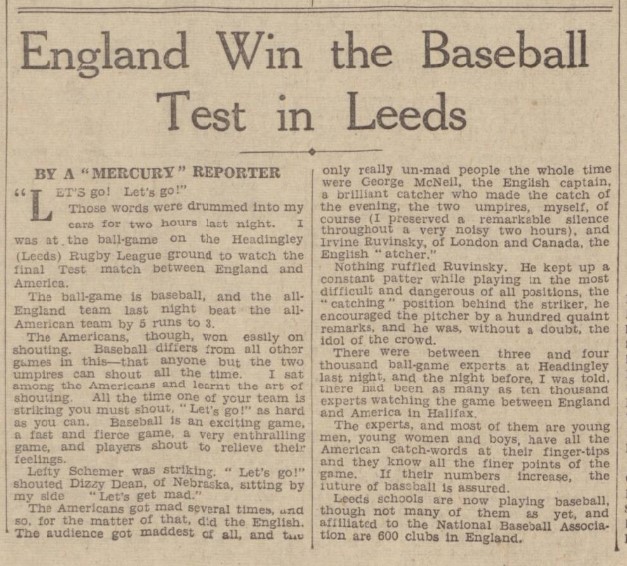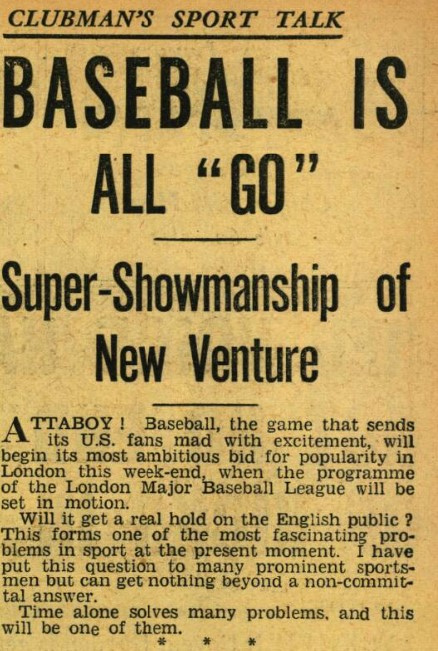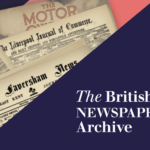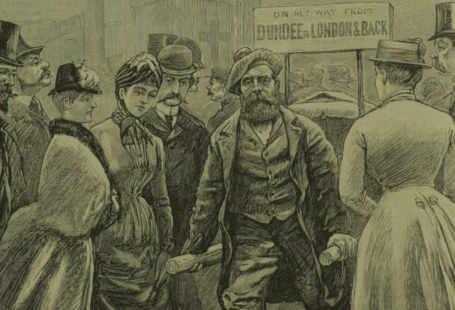Baseball is one of the quintessentially American summer sports, but did you know that the sport of baseball has a fascinating history in Britain? From the 1870s onwards, American players visited Britain to try and raise interest in the game. It was a slow start, but by 1938 the game of baseball had taken such a hold in Britain that a British team beat an American one at the inaugural Amateur World Series tournament.
So read on to discover more about the fascinating history of baseball in Britain, told through the pages of our newspaper Archive.
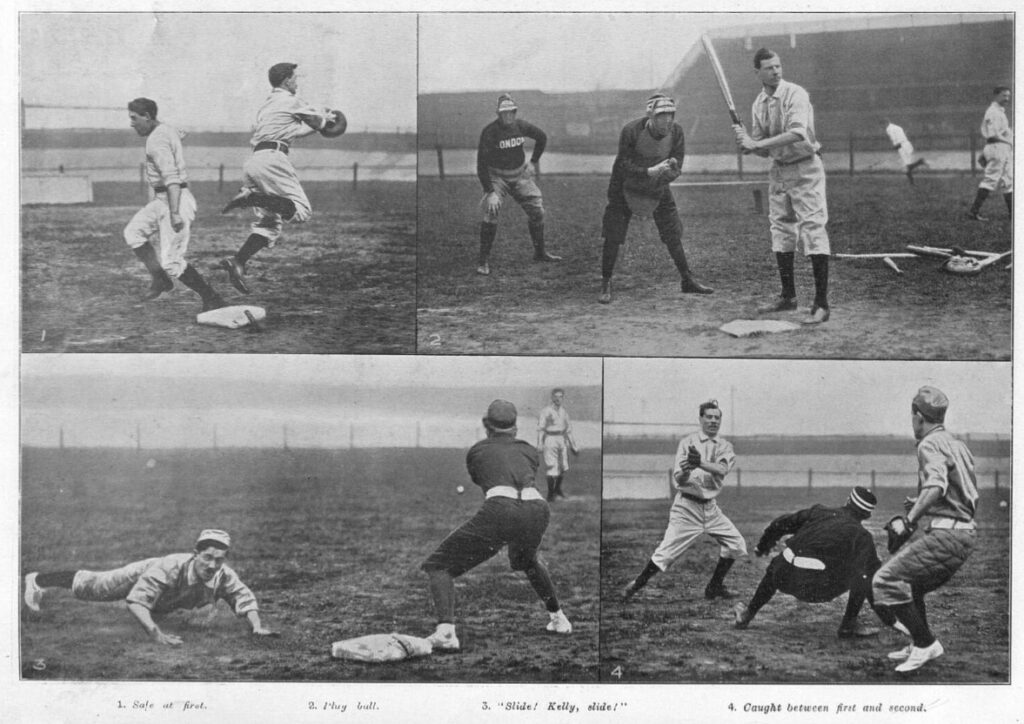
Register now and explore the Archive
Baseball comes to Britain
By 1874 the sport of baseball had long cemented itself in the American consciousness, but less so in the British one. It was with some curiosity, therefore, that the York Herald on 1 August 1874 reported on the arrival of ‘twenty-two base-ball players from America’ in Liverpool. The players had crossed the Atlantic from Philadelphia with the aim ‘to introduce into this country the great national game which at the other side of the Atlantic occupies the position of cricket among us.’
Accompanied by ‘a number of enthuastic admirers of the game,’ the players were from the ‘Boston Redstocking and the Philadelphia Athletic Base-ball Clubs,’ later the Boston Braves and the Philadelphia Athletics. They took their game to the home of cricket, playing a match at Lord’s on 3 August 1874, whilst also trying a hand at that particular British summer sport, the Illustrated Sporting and Dramatic News on 15 August 1874 reporting how the Richmond Cricket Club played ‘the American champions a game at cricket’ at the Old Deer Park.
The American visitors toured across Britain, the Penny Illustrated Paper on 22 August 1874 describing their visit to Sheffield. The penny paper related how the ‘base-ball was watched with the keenest interest by a large number of spectators, and the fine fielding of both teams was often loudly cheered.’ The Boston club were victorious, and the Americans even triumphed at cricket, trouncing their British opposition by ‘an innings and 42 runs.’
‘A Glorified Kind of Rounders’
In case the British public were not aware of what the game of baseball entailed, the British press was on hand to provide an explanation of the sport to its readers. The Taunton Courier and Western Advertiser on 26 August 1874 dubbed baseball as ‘a kind of glorified rounders,’ the ‘method in which runs are obtained [being] precisely the same as at rounders.’
Indeed, the article, which was widely syndicated at the time, was thoroughly disparaging about the sport of baseball, highlighting the ultimately cultural differences between Britain and the United States, a theme that would be reflected in relation to the game throughout the years. The piece described how:
That the use of the bat is not the most important feature in base-ball is at once evident. Thus one of the chief beauties of cricket is absent from the game…In the matter of bowling also the American seems far inferior to the English game. The variety of English bowling contrasts favourably with the apparent monotony of the pitching at base-ball. There is probably a great deal of skill in this which it is impossible to discern without a close acquaintance with the game; but the constant employment of the same action by all bowlers strikes an English eye as wearisome.
The article did have something positive to say, however, about baseball, praising the ‘continuous and rapid’ action of the game, and its ‘pretty’ elements. It was ultimately judged, though, that baseball would not ‘become so popular in England as to endanger the reign of cricket.’
Taking Baseball Global
So whilst the 1874 visit of the American baseball teams did not provoke a wide take up of the game in Britain, by 1889 the Americans were back. Under the management of Albert Goodwill Spalding (1849-1915), then president of the Chicago White Stockings (now the Chicago Cubs), a team of American baseball players arrived in Britain, keen to spread the gospel of baseball.
An article in the Newcastle Daily Chronicle on 7 March 1889 outlined Spalding’s aims for the tour:
The teams started with the object of visiting and playing in Australia only but the success achieved was so great that is was decided to circumnavigate the globe, and introduce the national game of America to every civilised country. They were well received in Italy, where their greatest triumph was getting permission to play in the Colosseum in Rome, but in France their reception has been somewhat indifferent.
According to the Elgin Courant, and Morayshire Advertiser on 19 March 1889, the American players were afforded a great reception. On their trip to Bristol from Paddington they were housed in a ‘special saloon carriage,’ and upon their arrival in the city they were met by the likes of the Duke of Beaufort and cricket legend W.G. Grace. Despite the chilly weather, a crowd of 5,000 people turned out to watch the game, which was played between Chicago and an All American side, Chicago being the victors. Indeed, even W.G. Grace himself was persuaded to try his hand at baseball, which the Elgin Courant reports he did ‘with great success.’
A few days later the Illustrated Sporting and Dramatic News described how the American baseball players had ‘performed four times in and near London, on each occasion, their play was witnessed by a large number of spectators.’ As for the likelihood of the game becoming more popular in Britain, the newspaper had this to say:
Whether the game will take root in England remains to be seen; but it would not perhaps be wise to be very sanguine about the matter, for the active members of the community are so wrapped up in cricket and football as to have but little time to think about any new pastime.
‘Considerable Interest’
On 27 March 1889 the Aberdeen Press and Journal observed that ‘in consequence of the recent visit of the American Baseball Team to London, considerable interest has been evinced throughout other centres in the country as to the nature of the game.’ However, whilst the idea of baseball might have been catching on in other parts of the country, Londoners were not so keen, the newspaper describing how ‘baseball has failed to attract in London.’ Indeed, the visit of the American baseball players had serve to increase interest in cricket, ‘far from lessening’ it has had been feared.
The American players, meanwhile, continued on to Ireland. The Dublin Daily Express on 28 March 1889 reported how baseball was played at Lansdowne Road, Dublin, in front of Prince Edward of Saxe Weimar and a crowd of 2,000 people. The Americans then departed from Queenstown (Cobh), and were ‘seen off…by a crowd.’
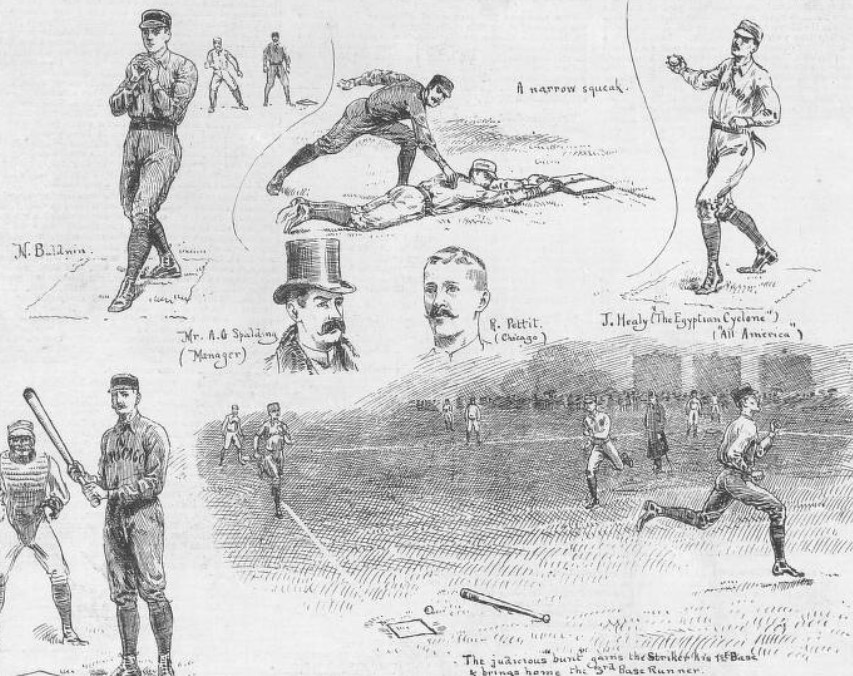
Sports publication Field on 30 March 1889 then reflected on the visit of the American baseball players. The piece worked to dispel the notion that the sports of baseball and rounders were similar, the article describing a match at Liverpool:
That there is a very remarkable difference in the two games was plainly evidenced on Saturday last at Liverpool, when the baseball players made a poor display at rounders, and the team representing the Liverpool Rounders Association failed as signally in their attempt to cope with the Americans at their game.
Field concluded on the tour:
Should another visit to England be determined upon, they may confidently expect to receive quite as warm a welcome, but they must not hope to find as many followers of their favourite game.
A British Baseball League
By the summer of 1889 plans were afoot to introduce baseball into Britain ‘as a summer pastime for football players.’ On 15 July 1889 the Wolverhampton Express and Star described how:
A party of American baseball players will arrive in this country this week, and it is proposed that two of them shall be allocated to London, two to Birmingham and the Midlands, and one each to the Potteries, Liverpool, Manchester, and Preston. They will establish baseball grounds, and give instruction free.
Baseball was taking hold on the country. In March 1890 Sporting Life reported how at a meeting of 200 members of football clubs in Middlesbrough, a decision was made to form ‘an amateur association for the Cleveland district,’ with ‘much enthusiasm’ being expressed for the plan.
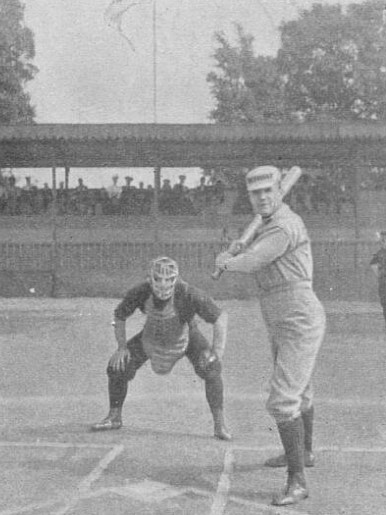
Indeed, you would be forgiven for thinking that baseball had truly taken root in Britain. On 2 June 1890 the Athletic News featured the following advertisement from promoter A.G. Spalding:
Baseball is the absorbing outdoor sport of the Americans, has taken a fast hold on Canadian Athletic Sportsmen, and is played with enthusiasm in Cuba, Japan, the Sandwich Islands, and Australia. A number of Clubs are being formed to put teams in the field in the North and Midland Districts next spring. All information regarding the game and the implements used may be obtained of A.G. Spalding & Bros, 38, Holborn Viaduct.
Meanwhile, football clubs were taking on each other in the summer at baseball, as proposed, in the National League of Baseball of Great Britain, the only professional baseball championship for a national title to have taken place in Britain. The Sheffield Daily Telegraph on 21 July 1890 described a meeting between Derby and Aston Villa, with the former team being victorious. However, by 15 August 1890 things were not looking so rosy for the Derby team. The Derbyshire Advertiser and Journal reported how, that ‘owing to the Derby Club not fulfilling its engagements, the League have struck them out of all former matches in the championship fixture.’
It was, as Sporting Life reported on 3 September 1890, the Aston Villa team who emerged as the ‘champions.’ But their victory was marred in controversary, with accusations of cheating levelled both at them and runners-up Preston North End.
Local Championships
Despite the 1890 championship being the only British national professional championship for baseball, baseball matches continued to be played in Britain. In September 1895 the Illustrated Sporting and Dramatic News reported on a match played at Crystal Palace between the Boston Amateurs and ‘a nine picked from the principal London clubs.’ That the Americans, who were described as ‘sturdy young fellows,’ won, was a foregone conclusion, but the victory was not as convincing as might have been expected.
The game itself was something of an event. Sat on the ‘sloping banks’ of the sports arena, a crowd, which included ‘many well-known musical hall people,’ of ‘considerably over a thousand’ watched the Londoners make a ‘a most creditable show.’ It was noted by the Illustrated Sporting and Dramatic News that the onlookers had ‘probably never seen baseball played before.’
Crystal Palace saw more baseball games that year, the Streatham News on 7 September 1895 reporting on a ‘local championship match’ between Remingtons and Fullers. The game, in which Remingtons triumphed, was ‘witnessed by a large crowd.’
Over ten years later and our newspapers continue to record baseball matches taking place in Britain. The old foes of Woolwich Arsenal and Tottenham Hotspur went head to head in June 1906, with the Holloway Press relating how the Arsenal got the better of Spurs in that encounter.
In 1910 Sporting Life detailed a meeting of the National Baseball Association. The sport in Britain is now governed by the British Baseball Federation, the National Baseball Association being one of its precursors. In this meeting ‘very satisfactory reports as to the prospects of playing grounds for the coming season were presented,’ whilst the opening of new ‘excellent’ grounds at New Beckenham and Tufnell Park were reported.
The First World War and Beyond
The outbreak of the First World War had a curious effect on baseball in Britain. The Illustrated Sporting and Dramatic News on 15 July 1916 described how:
One result of the influx of Canadian troops has been the awakening of interest in baseball. Leagues have been formed in some of the big Canadian camps in England, and there is one, which consisted of eight clubs until two of the competing units were ordered to France, in the London district. This league includes a team of Americans residing in London, and, although not enjoying such facilities for practice as do the Canadians, the Americans gave a Dominion nine a close game at Westcliff-on-Sea on Saturday last…
But despite such a resurgence in the interest in baseball, it was still not enough to imprint it firmly on the British national consciousness. An article published in the West London Observer, 27 September 1927, detailed one Mr. Hu. Forster’s efforts ‘to teach young Britishers baseball.’ Mr. Forster organised an introductory session to the sport, and a ‘large crowd’ turned out in spite of the ‘prevailing bad weather.’
The newspaper described how:
Although it was obvious that the majority were cricketers, they soon fell into the ways of the American game, and to an onlooker it seemed as if they had been playing baseball for a good time. Mr. Hu. Forster is anxious for as many as possible to learn the game, and will be pleased to answer all inquiries in this connection.
The 1930s – Baseball’s Golden British Decade
But by the end of the 1930s baseball was enjoying its golden British decade, due in part to the influence of American popular culture. The 1930s were also the golden years of cinema going, and young people were attracted to all things Hollywood, and by extension, all things American. Baseball was part of that American dream, and by the end of the 1930s it had reached the peak of its popularity in Britain.
In the summer of 1938 an American baseball team toured Britain. The Sheffield Independent on 18 August 1938 described their outing at Owlerton, where they took on a Yorkshire team. The newspaper reported that the American team displayed baseball skills of a ‘first-class character’ in their win over Yorkshire, billing the game as an ‘interesting one.’
The biggest draw of the 1938 summer baseball season was the international series to be played between England and America, in the 1938 Amateur World Series. There was a buzz about this series, with the Yorkshire Evening Post publishing the teams ahead of the match at Headingley on 18 August 1938.
A reporter for the Leeds Mercury provides a most vivid description of the final game of the series, which was played at the rugby league ground at Headingley. The reporter described how:
‘Let’s go! Let’s go!’ These words were drummed into my ears for two hours last night. I was at the ball-game on the Headingley (Leeds) Rugby League ground to watch the final Test match between England and America. The ball-game is baseball, and the all-England team last night beat the all-American team by 5 runs to 3. The Americans, though, won easily on shouting.
The report continued:
The Americans got mad several times, and so, for the matter of that, did the English. The audience got maddest of all, and the only really un-mad people the whole time were George McNeil, the English captain, a brilliant catcher who made the catch of the evening, the two umpires, myself, of course..and Irvine Ruvinsky, of London and Canada, the English ‘atcher.’ Nothing ruffled Ruvinsky. He kept up a constant patter while playing in the most dangerous of all positions, the ‘catching’ position behind the striker, he encouraged the pitcher by a hundred quaint remarks, and he was, without a doubt, the idol of the crowd.
This match was viewed by three to four thousand spectators, the previous match at Halifax having attracted ‘as many as ten thousand experts.’ As for the makeup of the crowd, they were mainly young people, the Leeds Mercury piece relating how:
The experts, and most of them are young men, young women and boys, have all the American catch-words at their finger-tips and they know all the finer points of the game. If their numbers increase, the future of baseball is assured. Leeds schools are now playing baseball, though not many of them as yet, and affiliated to the National Baseball Association are 600 clubs in England.
England were victorious in this the inaugural Amateur World Series, but were unable to defend their title in 1939 thanks to the advent of the Second World War.
A Good Season Ahead
There was a buzz around baseball in Britain by 1939. On 15 April 1939 the Burnley Express looked forward to a ‘good season,’ noting how ‘baseball will again be a sporting attraction in the Burnley district this summer.’ The local Burnley club was ‘receiving a good deal of support,’ with their first game due to take place against the Rochdale Rapids at Seedhill, Nelson, on 20 May 1939.
The Burnley club was keen to attract young players, and the Burnley Express put out a call for ‘any boys who are possessed of a good throwing arm.’ The newspaper was keen to point out the egalitarian nature of the game too, writing how:
The club provide facilities for the players to travel to away games, and in appealing for the support of working lads, points out that there is no snobbery about the game wherever it is played.
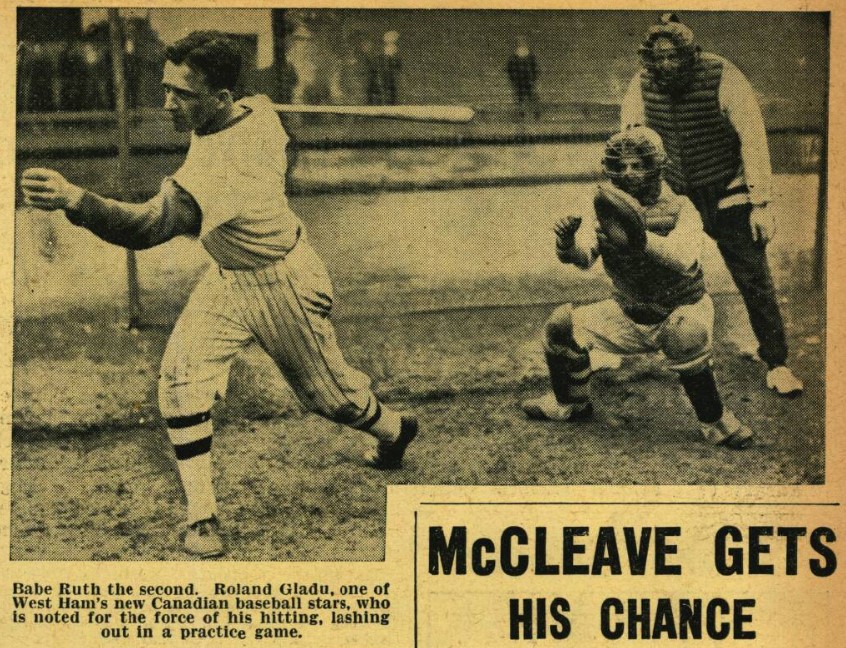
Meanwhile the Liverpool Echo on 2 May 1939 was reporting on the hopes of their local baseball team, the Liverpool Giants. They expected to field ‘the strongest [team] that has ever been on view since the game was introduced into Liverpool.’ The stadium had been improved ready for the new season, with the opening match set to be against Halifax.
And then, and then the Second World War broke out. Those young people who had swarmed the pre-war war stadiums in the golden sunlight of the late 1930s were inevitably called up, men into the armed services, women into various types of war work. The sport of baseball in Britain declined in popularity, although, had the war not interrupted, perhaps the game might have gone on to enjoy some of the popularity it still has in the United States.
Find out more about baseball, sport history, and much more besides, in the pages of our Archive today.


